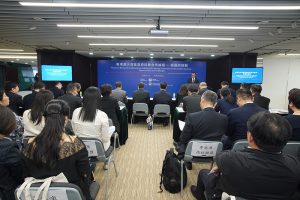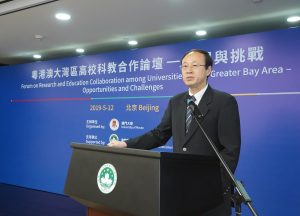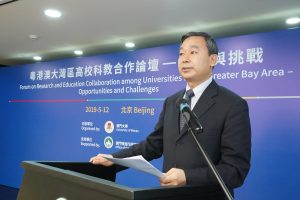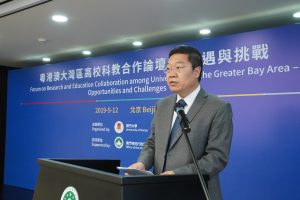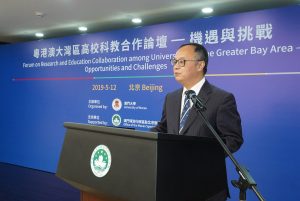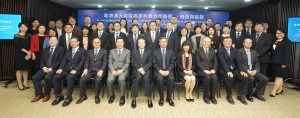To celebrate the 70th anniversary of the People’s Republic of China, the 20th anniversary of Macao’s handover to China, and the release of the Outline of the Strategies for the Development of the Guangdong-Hong Kong-Macao Greater Bay Area, the University of Macau (UM) today (12 May) held the Forum on Research and Education Collaboration among Universities in the Greater Bay Area – Opportunities and Challenges, in the Office of the Macao Special Administrative Region in Beijing. During the event, participants discussed the training and recruitment of professionals, collaboration and exchange among universities, and technology and innovation in the Greater Bay Area. The forum provided a platform for the participants to discuss how to seize the opportunities brought by the rapidly developing Greater Bay Area and how to take advantage of each university’s unique strengths to jointly enhance academic exchange, research collaboration, and collaborative innovation in the area.
The forum received support from the Office of the Macao SAR in Beijing. Heads of more than 20 universities in the Greater Bay Area and other regions participated in the event. During the opening ceremony, Wu Wei, head of the Department of Exchange and Cooperation of the Hong Kong and Macao Affairs Office of the State Council, said that the universities in the Greater Bay Area may consider further deepening academic exchange and collaboration, adding that the Greater Bay Area provides new opportunities for joint development among institutions.
Xu Yongji, deputy managing director of the Department of International Cooperation and Exchanges, Office of Hong Kong, Macao and Taiwan Affairs, Ministry of Education, said that the Guangdong province, Hong Kong, and Macao complement each other as a whole with their unique advantages, which laid down the foundation for building an important higher education certre of the world in the Greater Bay Area and a training ground for innovative professionals
Chen Jiachang, deputy director of the Department of International Cooperation, Office of Hong Kong, Macao and Taiwan Affairs, Ministry of Science and Technology, and director of the China Science and Technology Exchange Center, said that the Guangdong-Hong Kong-Macao University Alliance established a systemic channel for collaboration in science and technology education and talent development among the Guangdong province, Hong Kong, and Macao, which helps to tighten collaboration among institutions in the three regions, adding that the scientists from these institutions are welcome to participate in joint sponsored research projects.
Yonghua Song, rector of UM, said that UM will continue to develop itself into a global university rooted in Macao, integrated into the Greater Bay Area, and geared towards China and beyond. He added that as collaboration leads to progress and the creation of a win-win situation, UM will actively collaborate with other universities in the area in teaching and research.
The Guangdong-Hong Kong-Macao University Alliance was jointly founded by UM, Sun Yat-sen University (SYSU), and the Chinese University of Hong Kong (CUHK) in 2016. It is currently comprised of 28 major universities in the Greater Bay Area. During the event, the university presidents gave keynote speeches. Luo Jun, president of SYSU, proposed three strategies for taking advantage of each university’s unique strengths, namely nurturing more innovative professionals for the Greater Bay Area, producing more innovative results for the area through basic research, and gathering more resources for innovation for the area through collaboration.
The ever-increasing comprehensive strengths of the Greater Bay Area has made it possible to enhance collaboration between institutions in Guangdong, Hong Kong, and Macao and to create greater scope for development in each region. According to Rocky Tuan, vice-chancellor and president of CUHK, CUHK will play an active role in industrialisation, teaching, and research, adding that the university has formulated policies and development strategies to complement the strengths of other institutions in the Greater Bay Area. According to him, CUHK is ready to grasp the opportunities and rise to the challenges in order to increase its competiveness and impact in higher education.
According to the Outline of the Strategies for the Development of the Guangdong-Hong Kong-Macao Greater Bay Area, Macao is the only central city on the west bank of the Pearl River, and UM the strongest comprehensive university in the region. UM is committed to providing support to Macao in its effort to integrate into the Greater Bay Area. According to UM Rector Song, the development of the Greater Bay Area requires collaboration in teaching and research between universities, innovation and technology, an innovative mechanism for educational collaboration, and a platform for nurturing outstanding professionals. In the future, UM will continue to leverage its unique strengths to develop into a a centre for technological innovation and personnel training on the west bank of the Pearl River.
The Greater Bay Area enjoys unique strengths and enormous potential thanks to its advantageous geographic location. Yang Bin, vice president of Tsinghua University, says that the university will enhance collaboration and exchange with other members of the university alliance in various areas, including talent development, scientific research, and community service, by concentrating resources, encouraging collaborative innovation, and promoting talent development, in order to contribute to higher education development in China. Zhou Zuoyu, vice president of Beijing Normal University, says that the university’s Zhuhai campus plans to establish a Belt and Road institute to promote interdisciplinary innovation and the development of the Greater Bay Area.
Source: Communications Office
Media Contact Information:Communications Office, University of Macau
Albee Lei Tel:(853) 88228004Kelvin U Tel:(853) 88224322Email:prs.media@um.edu.mo
UM Website:www.um.edu.mo

